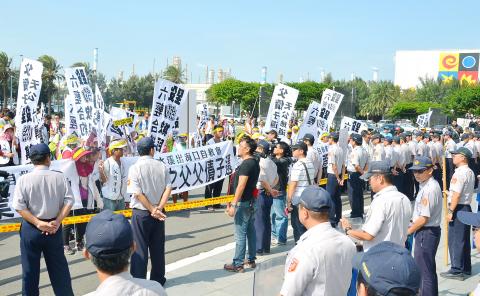A local self-help association raised up a coffin at the gates of Formosa Petrochemical Corp’s naphtha cracker in Yunlin County’s Mailiao Township (麥寮) yesterday to protest the company failing to compensate for fish farms they say it is responsible for destroying.
The protesters said that Formosa Petrochemical overpumped the sand west of their fish farms on the southern bank of the Jhuoshuei River (濁水溪) during construction projects in 1995 and 1996, destroying about 364 hectares of land that 82 association members had rented from the government to set up their farms.
Holding white flags that read: “A father’s debt should be returned by his son” and scattering paper money in the air, the demonstrators said that late Formosa Petrochemical chairman Wang Yung-ching (王永慶) had signed a memorandum of understanding with the association on June 4, 1994, promising to pay damages to those whose fish farms were affected by the company’s construction projects.

Photo: CNA
However, the company has not and is still unwilling to compensate the farm owners, the protesters said.
Association chairman Chou Lien-fu (周連福) said the fish farms were destroyed because the company had pumped sand too deeply and too close to their land, adding that since there is no deadline for adhering to the memorandum of understanding, the farm owners are still hoping that Formosa Petrochemical will honor its promise.
The crowd of protesters clashed with police who tried to prevent them from lifting up the coffin and pushing through gates.
According to one of the company’s managers, the fish farms were actually destroyed by Typhoon Herb in 1996, and Formosa Petrochemical has commissioned research facilities to assess the situation and proved that the damage has nothing to do with its sand-pumping operation.
The company said it is unreasonable that the association is asking for NT$1 billion (US$34 million) in compensation, when damage assessments carried out in 1996 already showed that the sand-pumping did not harm the fish farms.
Given this, it is refusing to agree to the association’s demands and suggested that the farm owners take the case to court if they want to pursue the matter further.

CAUTION: Based on intelligence from the nation’s security agencies, MOFA has cautioned Taiwanese travelers about heightened safety risks in China-friendly countries The Ministry of Foreign Affairs (MOFA) yesterday urged Taiwanese to be aware of their safety when traveling abroad, especially in countries that are friendly to China. China in June last year issued 22 guidelines that allow its courts to try in absentia and sentence to death so-called “diehard” Taiwanese independence activists, even though Chinese courts have no jurisdiction in Taiwan. Late last month, a senior Chinese official gave closed-door instructions to state security units to implement the guidelines in countries friendly to China, a government memo and a senior Taiwan security official said, based on information gathered by Taiwan’s intelligence agency. The

Taiwan Semiconductor Manufacturing Co (TSMC), the world’s largest contract chipmaker, said yesterday that it is looking to hire 8,000 people this year, at a time when the tech giant is expanding production capacity to maintain its lead over competitors. To attract talent, TSMC would launch a large-scale recruitment campaign on campuses across Taiwan, where a newly recruited engineer with a master’s degree could expect to receive an average salary of NT$2.2 million (US$60,912), which is much higher than the 2023 national average of NT$709,000 for those in the same category, according to government statistics. TSMC, which accounted for more than 60 percent

The National Immigration Agency (NIA) said yesterday that it will revoke the dependent-based residence permit of a Chinese social media influencer who reportedly “openly advocated for [China’s] unification through military force” with Taiwan. The Chinese national, identified by her surname Liu (劉), will have her residence permit revoked in accordance with Article 14 of the “Measures for the permission of family- based residence, long-term residence and settlement of people from the Mainland Area in the Taiwan Area,” the NIA said in a news release. The agency explained it received reports that Liu made “unifying Taiwan through military force” statements on her online

Tung Tzu-hsien (童子賢), a Taiwanese businessman and deputy convener of the nation’s National Climate Change Committee, said yesterday that “electrical power is national power” and nuclear energy is “very important to Taiwan.” Tung made the remarks, suggesting that his views do not align with the country’s current official policy of phasing out nuclear energy, at a forum organized by the Taiwan People’s Party titled “Challenges and Prospects of Taiwan’s AI Industry and Energy Policy.” “Taiwan is currently pursuing industries with high added- value and is developing vigorously, and this all requires electricity,” said the chairman